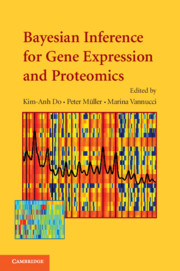Book contents
- Frontmatter
- Contents
- List of Contributors
- Preface
- 1 An Introduction to High-Throughput Bioinformatics Data
- 2 Hierarchical Mixture Models for Expression Profiles
- 3 Bayesian Hierarchical Models for Inference in Microarray Data
- 4 Bayesian Process-Based Modeling of Two-Channel Microarray Experiments: Estimating Absolute mRNA Concentrations
- 5 Identification of Biomarkers in Classification and Clustering of High-Throughput Data
- 6 Modeling Nonlinear Gene Interactions Using Bayesian MARS
- 7 Models for Probability of Under- and Overexpression: The POE Scale
- 8 Sparse Statistical Modelling in Gene Expression Genomics
- 9 Bayesian Analysis of Cell Cycle Gene Expression Data
- 10 Model-Based Clustering for Expression Data via a Dirichlet Process Mixture Model
- 11 Interval Mapping for Expression Quantitative Trait Loci
- 12 Bayesian Mixture Models for Gene Expression and Protein Profiles
- 13 Shrinkage Estimation for SAGE Data Using a Mixture Dirichlet Prior
- 14 Analysis of Mass Spectrometry Data Using Bayesian Wavelet-Based Functional Mixed Models
- 15 Nonparametric Models for Proteomic Peak Identification and Quantification
- 16 Bayesian Modeling and Inference for Sequence Motif Discovery
- 17 Identification of DNA Regulatory Motifs and Regulators by Integrating Gene Expression and Sequence Data
- 18 A Misclassification Model for Inferring Transcriptional Regulatory Networks
- 19 Estimating Cellular Signaling from Transcription Data
- 20 Computational Methods for Learning Bayesian Networks from High-Throughput Biological Data
- 21 Bayesian Networks and Informative Priors: Transcriptional Regulatory Network Models
- 22 Sample Size Choice for Microarray Experiments
- Plate section
Preface
Published online by Cambridge University Press: 23 November 2009
- Frontmatter
- Contents
- List of Contributors
- Preface
- 1 An Introduction to High-Throughput Bioinformatics Data
- 2 Hierarchical Mixture Models for Expression Profiles
- 3 Bayesian Hierarchical Models for Inference in Microarray Data
- 4 Bayesian Process-Based Modeling of Two-Channel Microarray Experiments: Estimating Absolute mRNA Concentrations
- 5 Identification of Biomarkers in Classification and Clustering of High-Throughput Data
- 6 Modeling Nonlinear Gene Interactions Using Bayesian MARS
- 7 Models for Probability of Under- and Overexpression: The POE Scale
- 8 Sparse Statistical Modelling in Gene Expression Genomics
- 9 Bayesian Analysis of Cell Cycle Gene Expression Data
- 10 Model-Based Clustering for Expression Data via a Dirichlet Process Mixture Model
- 11 Interval Mapping for Expression Quantitative Trait Loci
- 12 Bayesian Mixture Models for Gene Expression and Protein Profiles
- 13 Shrinkage Estimation for SAGE Data Using a Mixture Dirichlet Prior
- 14 Analysis of Mass Spectrometry Data Using Bayesian Wavelet-Based Functional Mixed Models
- 15 Nonparametric Models for Proteomic Peak Identification and Quantification
- 16 Bayesian Modeling and Inference for Sequence Motif Discovery
- 17 Identification of DNA Regulatory Motifs and Regulators by Integrating Gene Expression and Sequence Data
- 18 A Misclassification Model for Inferring Transcriptional Regulatory Networks
- 19 Estimating Cellular Signaling from Transcription Data
- 20 Computational Methods for Learning Bayesian Networks from High-Throughput Biological Data
- 21 Bayesian Networks and Informative Priors: Transcriptional Regulatory Network Models
- 22 Sample Size Choice for Microarray Experiments
- Plate section
Summary
Recent rapid technical advances in genome sequencing (genomics) and protein identification (proteomics) have given rise to research problems that require combined expertise from statistics, biology, computer science, and other fields. The interdisciplinary nature of bioinformatics presents many research challenges related to integrating concepts, methods, software, and multiplatform data. In addition to new tools for investigating biological systems via high-throughput genomic and proteomic measurements, statisticians face many novel methodological research questions generated by such data. The work in this book is dedicated to the development and application of Bayesian statistical methods in the analysis of high-throughput bioinformatics data that arise from problems in medical research, in particular cancer research, and molecular and structural biology. This book does not aim to be comprehensive in all areas of bioinformatics. Rather, it presents a broad overview of statistical inference problems related to three main high-throughput platforms: microarray gene expression, serial analysis gene expression (SAGE), and mass spectrometry proteomic profiles. The book's main focus is on the design, statistical inference, and data analysis, from a Bayesian perspective, of data sets arising from such high-throughput experiments.
Chapter 1 provides a detailed introduction to the three main data platforms and sets the scene for subsequent methodology chapters. This chapter is mainly aimed at nonbiologists and covers elementary biological concepts, details the unique measurement technology with associated idiosyncrasies for the different platforms, and generates an overall outline of issues that statistical methodology can address.
Subsequent chapters focus on specific methodology developments and are grouped approximately by the main bioinformatics platform, with several chapters discussing the integration of at least two platforms.
Information
- Type
- Chapter
- Information
- Bayesian Inference for Gene Expression and Proteomics , pp. xv - xviiiPublisher: Cambridge University PressPrint publication year: 2006
